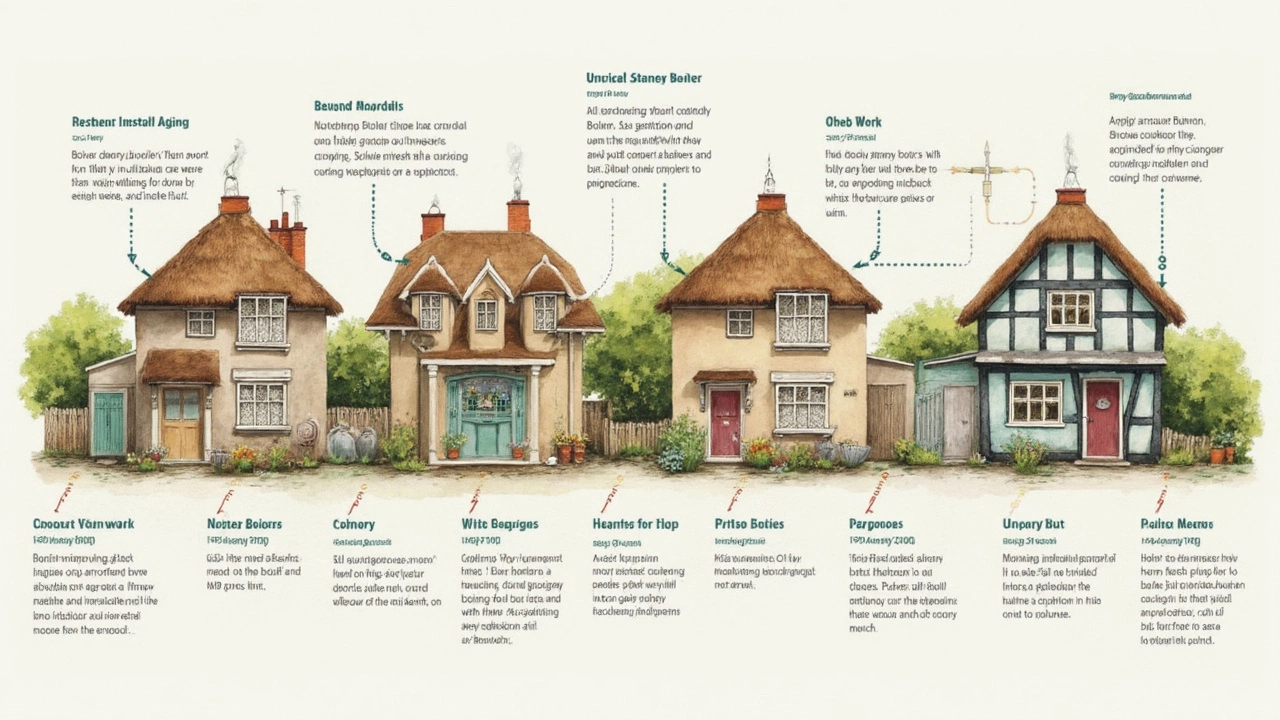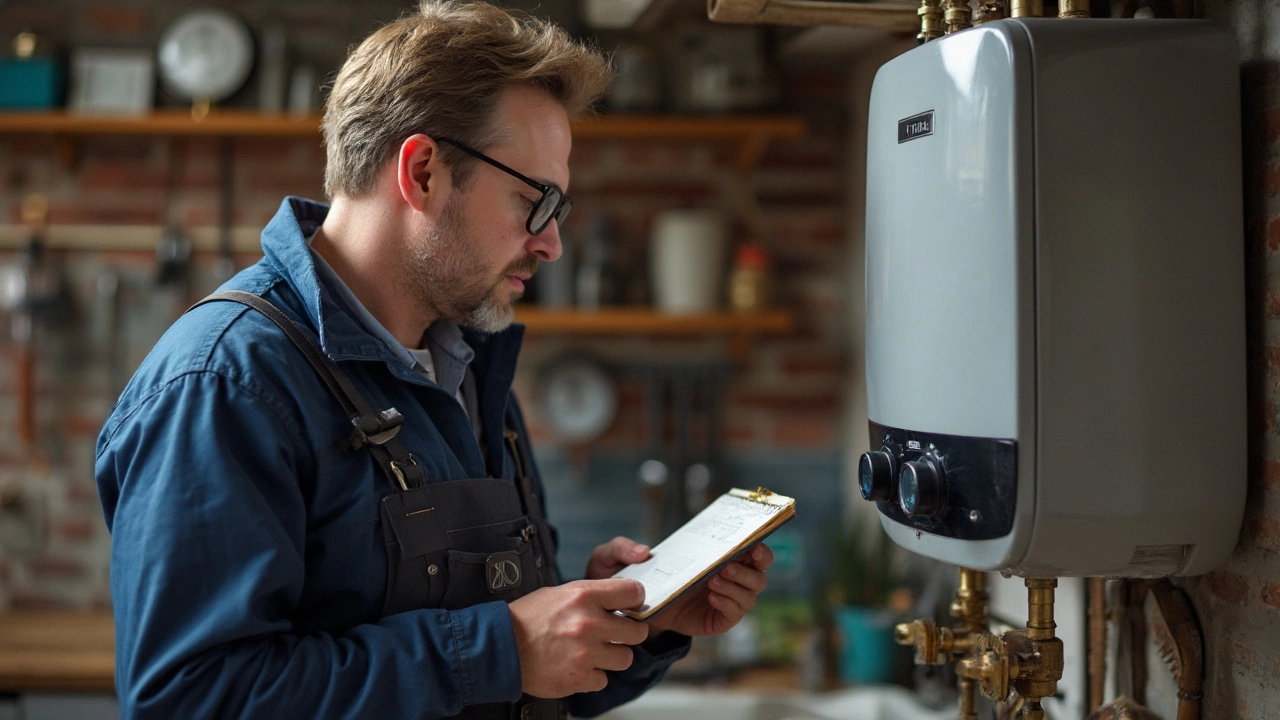If you're asking yourself how long a boiler typically lasts, you're already on a smart track. Boilers are like the sturdy workhorses of home heating. They keep the warmth coming even when it's freezing outside. But, nothing lasts forever—boilers included. On average, a well-maintained boiler can serve you efficiently for about 10 to 15 years. Of course, this can vary depending on a bunch of factors like usage and maintenance practices.
It's crucial to understand these factors so you can squeeze every last drop of functionality out of your current system. Also, being aware of the signs that point to a boiler on its last legs can save you a cold emergency shower in the middle of January. Seriously, no one wants that.
- How long do boilers typically last?
- Factors influencing boiler lifespan
- Signs it's time for a repair or replacement
- Maintenance tips to extend lifespan
- When to consider an upgrade
How Long Do Boilers Typically Last?
So you're wondering, how long will your trusty boiler keep working its magic? Typically, most boilers give you a good run of about 10 to 15 years before they start showing signs of calling it quits. But, like any appliance, this isn't set in stone. Factors like how often you use it and how well you maintain it can make a huge difference.
Here's the thing: most boilers aren't just about ticking a certain number of years. Instead, they're about usage, material quality, and the type. For instance, a high-quality boiler that's regularly checked and cleaned might surprise you by outperforming its expected lifespan. On the other hand, neglecting maintenance can shave off several years—even from the best models.
There are generally two main types of boilers: gas and electric. Gas boilers are known for lasting around 10 to 15 years, especially if they're serviced annually. Electric boilers, although sometimes not as powerful, often have a similar lifespan but can be more consistent without gas emissions.
When you think about it, maintaining a boiler is like taking care of a car. Regular check-ups, a quick tune-up, and a bit of TLC can extend its life considerably. Heating experts usually recommend annual services to keep everything in tip-top shape. During these services, any issues that might curb your boiler's life expectancy can be caught early.
- Gas Boilers: Typically last 10-15 years with proper care.
- Electric Boilers: Known for similar longevity, often more stable with modern advancements.
- Oil Boilers: Can last up to 25 years due to their robust nature, but often come with higher maintenance costs.
Ever wondered about the stats? Here's a quick peek. The Department of Energy reports that the efficiency of boilers drops as they age, meaning any boiler over 15 years is likely operating at much less than its original efficiency.
Although it's tempting to stick with the familiar, hanging onto an outdated or inefficient boiler might cost you more in bills and repairs. Knowing when to upgrade isn't just beneficial for your wallet—it can be a lifesaver if the boiler decides to bow out unexpectedly come winter.
Factors Influencing Boiler Lifespan
So, what really makes or breaks a boiler's lifespan? It's not just about how old it is. There are several key factors at play that affect how long your trusty heating system might last.
First up, the maintenance game is crucial. Regular check-ups can make all the difference. A well-maintained boiler is like a car that's had all its oil changes and tire rotations—it's just going to run smoother and longer. An annual service can catch little issues before they snowball into big problems.
Then there's the quality of installation. You wouldn't build a house on a shaky foundation, right? A poor installation can set the stage for numerous issues down the line, making your boiler work harder than it should, which isn’t great for its longevity.
- Water quality: If your home's water is hard or full of minerals, it can cause scaling inside your boiler, affecting its efficiency and lifespan.
- Type of boiler: Some types, like condensing boilers, tend to be more efficient and might last longer if properly maintained.
- Frequency of use: Obviously, boilers that work around the clock in extreme climates might wear out quicker than those used less frequently.
According to John Parker, a seasoned HVAC professional with years under his belt, "
Consistent maintenance and appropriate use significantly extend a boiler's performance. Investing in quality installation and regular check-ups pays off in the long run."
Lastly, the manufacturer's reputation and the model itself play a role. Some brands are known for their durability and reliability. It's like choosing between a dependable trusty car and a finicky luxury vehicle—your choice might influence how often you'll find yourself needing repairs.
Think about these factors next time you ponder your boiler's health, and you'll be on your way to getting the most out of your home heating system.

Signs It's Time for a Repair or Replacement
So, how can you tell if your trusty boiler is about to retire? Keeping an eye out for certain symptoms can save you from unexpected breakdowns and a hefty bill. Here are the telltale signs:
- Frequent Breakdowns: If your boiler is constantly on the fritz and you find yourself calling in the repair crew more often than you'd like, it might be time to think about a replacement. Repair costs can quickly stack up and outweigh the price of a new boiler.
- Strange Noises: Odd bangs, whistling, or gurgling noises are like your boiler's way of saying it's not feeling its best. These sounds usually indicate issues with internal parts or low water pressure.
- Rising Energy Bills: If your energy bills are climbing despite not doing anything different, an aging boiler could be guzzling energy inefficiently. A newer model might have better energy efficiency.
- Inconsistent Heating: Are some rooms colder than others? This might be a sign your boiler is struggling to distribute heat evenly across your home.
- Yellow Flame: A healthy boiler should have a blue flame. Yellow is a warning that your boiler isn't burning fuel efficiently and could even be dangerous due to carbon monoxide risks.
As boiler expert Chris Johnson puts it,
"Ignoring early signs of failure isn't wise. A boiler giving frequent error signals is a boiler asking for attention." 8
When you're noticing these signs, it's smart to weigh the pros and cons of repairing versus replacing. Generally, if your boiler is less than 10 years old and repairs aren't breaking the bank, fixing it might still be the way to go. But if you're dealing with an old-timer that's costing you more than it's worth, a replacement could be more cost-effective in the long run.
Keep these pointers in mind next time you're standing in front of your boiler scratching your head. Remember, it's better to act sooner rather than wait for that mid-winter breakdown.
Maintenance Tips to Extend Lifespan
Want your boiler to live its best life? Regular maintenance is key. Ignoring little issues can lead to bigger, wallet-draining problems. Here’s how to keep your boiler ticking longer than the average lifespan.
Annual check-ups: Think of them as a doctor visit for your boiler. Getting your boiler repair crew to inspect things once a year can catch potential issues before they turn into costly repairs.
Bleeding the radiators: Trapped air in your system can cause inefficiency. Bleed your radiators to keep the system working smoothly. It’s as simple as turning a small valve to release air until you get a steady stream of water.
Keep it clean: Dust and debris can meddle with your boiler's efficiency. Dust off the heating vent and ensure nothing clogs the pipes and filters so everything runs smoothly.
- Monitor pressure: The boiler pressure gauge should generally be between 1 and 2 bars. If it’s off, consult your manual or your heating expert for adjustments.
- Deal with leaks: If you notice dampness around your boiler, it’s likely a sign of a leak. Don’t ignore it. Addressing leaks quickly can prevent rust and more severe issues.
It’s also wise to keep an eye out for any odd noises or unusual behaviors from your home heating system. These might indicate early signs of trouble.
To give you an idea of how a bit of proactive care pays off, here’s a quick table:
| Maintenance Action | Impact on Lifespan |
|---|---|
| Annual Service | Up to 5 more years |
| Regular Cleaning | Improves efficiency by 15% annually |
| Bleeding Radiators | Reduces strain, extending life by 2 years |
So, keeping up with these maintenance tasks could be the difference between having a boiler that needs replacing at 10 years or getting that thing to last beyond 15. Investing a bit of time regularly extends both lifespan and efficiency, saving money and hassle in the long run.

When to Consider an Upgrade
Deciding when to upgrade your boiler isn't just about age, even though age is a pretty good indicator. If yours is pushing the upper limits of that 10 to 15-year range and starting to act up, it might be time to start looking at new models.
One key sign that it’s time for a new boiler is frequent breakdowns. If you feel like you're on a first-name basis with the boiler repair guy, that's a major red flag. Those repair costs can add up quickly, and before you know it, you're spending more on fixes than a new boiler would cost.
If your energy bills are on a steady climb every month, that’s another glaring signal. Older boilers lose their efficiency over time. A new energy-efficient model can actually save money in the long term, even if the upfront cost seems daunting.
Noises are another hint. If your boiler is clunking and banging like it's starring in a one-man band, it's not just a random quirk. Persistent strange sounds usually mean something is not right internally.
Modern boilers come with a lot of perks—better efficiency, smart thermostats, and a reduced carbon footprint, which is pretty cool for the planet. Some stats might help you realize the benefits. According to the Energy Saving Trust, replacing an old G-rated gas boiler with a new A-rated condensing one could save around £300 a year on heating bills.
In summary, if your boiler is acting up frequently, burning a hole in your wallet with repairs and energy costs, or just plain too loud, it might be time to consider an upgrade. A new boiler doesn’t just mean better home heating; it’s an investment in the comfort and value of your home.


